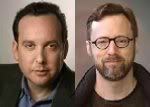
By Lars Trodson
I've been to Connecticut twice for different reasons in the past month, and during one of the trips I took a ride through Willimantic, which is where I spent some time when I was a kid. My mother grew up in a big old Victorian house on Church Street in that city, and lived with her grandmother Harriet Bass Fenton. I knew my Grandma Fenton -- she died in 1968 at the age of 93. I found her cane once and she rewarded me with a nickle. Her husband, my great grandfather, ran a company in Willimantic called the Windham Silk Co.
Robert Fenton had a brother, Horace Jewell Fenton. Both Robert and Horace seemed to know what they wanted to do when they were quite young. I have one letter written by each of them on the same day in 1887, and Robert writes about how they were building a new school in the town where they were living then, Saccarappa, Maine (now Westbrook). He later became an engineer and helped build the original pier at Old Orchard Beach. I have a scrapbook of his photos from that project.
Brother Horace writes that he can't wait to put his boat in the water, and he later had a career in the Navy. We always knew he wrote a law book that was once taught at The Naval Academy, but I had never seen it.
But I've seen it now, thanks to Google Library.
Here's the book:
http://www.archive.org/stream/constitutionall01unkngoog#page/n0/mode/1up
Pretty cool.










 They're serious. They're grown-ups. They wear black jackets and they use big words. If you missed the Sept. 5 debut of its post Lyons/Mankiewicz resurrection, Buena Vista Entertainment has rolled out an online look at the updated,
They're serious. They're grown-ups. They wear black jackets and they use big words. If you missed the Sept. 5 debut of its post Lyons/Mankiewicz resurrection, Buena Vista Entertainment has rolled out an online look at the updated, 

